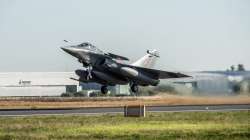What makes Rafale - poster child of transformational aircraft — one of the world's most powerful fighter jets
The first batch of 5 Rafale fighter jets from Dassault Aviation's Merignac facility in France is on way to India. One of the world's most powerful fighter jets will be inducted to the Indian Air Force's Golden Arrows Squadron in Ambala. IndiaTvNews.com explains what makes the Rafale fighter jets the most destructive, powerful flying machine in the world.

The first batch of 5 Rafale fighter jets from Dassault Aviation's Merignac facility in France is on way to India. One of the world's most powerful fighter jets will be inducted to the Indian Air Force's Golden Arrows Squadron in Ambala. IndiaTvNews.com explains what makes the Rafale fighter jets most destructive, powerful flying machine in the world. India will be acquiring 36 Rafale fighter jets in a government-to-government deal from France.
Rafale: Unique's Omnirole design that does the work of at least 7 different planes
Experts believe the design is sufficient to replace seven different fighter aircraft. Rafale can carry out this wide-range of missions and is often termed as the -- Force Multiplier.
- Air-defense / air-superiority
- Anti-Access/Aera Denial
- Reconnaissance
- Close air support
- Dynamic Targeting
- Air-to-ground precision strike/interdiction
- Anti-ship attacks
- Nuclear deterrence
- buddy-buddy refueling
Rafale top speed
Rafale fighter jets can attain a maximum speed of 1400 kmph or 704 knots. Its approach speed is less than 224 kmph.
Rafale combat range
Combat range is the maximum range an aircraft can fly when carrying ordnance. Rafale fighter jet with full fuel tank and fully loaded combat weapons can travel up to 3,200-3,700 km.
Optimised airframe and Delta Wing Configuration keeps it fully agile at high-angle of attack
The Rafale, a fully “Omnirole” fighter, is available in three variants:
- Rafale C single-seater operated from land bases.
- Rafale M single-seater for carrier operations.
- Rafale B two-seater flown from land bases.
All three variants share a common airframe and a common mission system, the differences between naval and land versions being mainly limited to the undercarriage and to the arresting hook.
The close-coupled canards/delta wing configuration is key to the combat performance of the Rafale: even at high angle-of-attack, it remains fully agile, and its range performance in strike missions with heavy weapon loads is unmatched for such a compact design.
Stability
An advanced digital “Fly-by-Wire” (FBW) Flight Control System (FCS) gives it longitudinal stability and superior handling performance. The FCS is quadruple redundant with three digital channels and one separately designed analogue channel. In simple terms, the control system has three different digital channels (each one independent of another) and one analog channel.
Superior Flight Control System
The Flight Control System of the Rafale attains the highest level of flight safety. Dassault Aviation claims million flight hours without a single accident caused by the FCS.
Rafale: Wide range of smart and discrete sensors
Rafale is the first operational – and so far, the only – European combat aircraft to use an electronic scanning radar. Developed by Thales, the RBE2 radar has benefited from a massive research effort and from Thales' unmatched know-how based on past experience. Compared to radars with conventional antennas, unprecedented levels of situational awareness are attained with earlier detection and tracking of multiple targets. Check all Rafale censors:
- Rafale with Front Sector Optornics – FSO
- Rafale with Spectra – Internal electronic Warfare Suite
- Rafale with Net-Centric capability
- Rafale with Talios - Targetting and Laser Designation Pad
- AREAOS - Recce Pod with quick analysis capability
Rafale has a multisensor data fusion
What makes the essential difference is the Rafale’s “multi-sensor data fusion” process running on data provided by all the sensors of the aircraft. In essence, the “multi-sensor data fusion” concept implemented into the Rafale allows the pilot to act as a true “tactical decision maker”, rather than being only a sensor operator. The FSO’s powerful TV sensor (cued by the Rafale’s active and passive sensors) is truly valuable to positively identify targets in situations where a visual contact is required by the rules of engagement.
Rafale has a full range of advanced weapons
The mission system of the Rafale has the potential to integrate a variety of current and future armaments. Rafale can launch a number of weapons such as:
-
MICA: Air-to-air “Beyond Visual Range” (BVR) interception, combat and self-defence missiles
- METEOR: Very long-range air-to-air missile, The METEOR very long-range rocket and ram-jet powered air-to-air EM missile.
- The HAMMER: Highly Agile and Manoeuvrable Munition Extended Range modular, rocket-boosted air-to-ground precision-guided weapon series, fitted with INS/GPS or INS/GPS/IIR (imaging infra-red) guidance kits, or with the upcoming INS/GPS/laser guidance.
- SCALP: Long-range stand-off missile
- AM39 EXOCET anti-ship missile
- Laser-guided bombs with different warheads from 500lbs to 2,000 lbs
- Classic bombs non guided
- 2500 rounds/min NEXTER 30M791 30 mm internal cannon, available on both single and two-seaters.
Rafale fighter jet full specification
(Information source: Dassault Aviation Website)